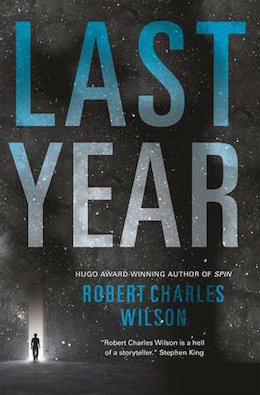In the near future, time travel technology allows a wealthy real estate magnate to open a huge passageway to the 19th century. Five stories tall, the “Mirror” can be used to transfer not only people but even heavy equipment to the past. The result is the city of Futurity, an outpost of the 21st century on the plains of 1876 Illinois. Equal parts colony and tourist destination for curious visitors from the future, Futurity is the crossroads where two versions of America meet.
Jesse Cullum works security in Futurity’s Tower Two, which is the part of the city open to 19th century “locals” who want to experience 21st century wonders like air conditioning and heated swimming pools or get a look at the dioramas giving a carefully edited glimpse of the future world. After Jesse foils an attempt to assassinate the visiting U.S. president Ulysses S. Grant, Futurity’s management asks him to help in the subsequent investigation. The would-be assassin’s weapon was a Glock, which could only have come from the future. Jesse and his partner Elizabeth, a 21st century woman, must work together to figure out how a gun from the future ended up in the hands of a 19th century assassin…
The best way to think of Robert Charles Wilson’s new novel Last Year is as a reverse time travel story. The narrator isn’t a time traveler but instead Jesse Cullum, an inhabitant of the 19th century. The technologically advanced time travelers visiting the 19th century aren’t from the far future; instead they are, not to put too fine a point on it, us.
Culture shock is a common enough theme in time travel fiction, but in this case the culture that is so shocking to the 19th century locals is, well, ours. Jesse Cullum is a relatively open-minded guy for his time, but even he finds it hard to imagine a future in which an African-American man is president, women can vote, and same sex marriage is legal. The reaction of the average inhabitant of 19th century America to these facts ranges from shock to disbelief, which is why Futurity’s management provides basic cultural awareness training for its local employees, just to make sure they don’t inadvertently insult 21st century guests by using racial epithets or questioning why women wear trousers.
At the same time, it becomes increasingly clear that Futurity’s main purpose is corporate profit and that, ethically speaking, exploiting a past version of one’s own world is more than a little questionable, even taking Robert Charles Wilson’s unique solution to the grandfather paradox into account. I won’t go into further detail here to avoid spoilers, but let’s just say that that I wouldn’t be surprised to see Wilson explore some of the hints about the 21st century and the origins of the time travel technology in a future novel.
If this unique setting where past and present collide isn’t enough, Robert Charles Wilson populates the story with wonderfully complex characters. Jesse Cullum initially feels like an unassuming, steadfast security officer with an unusual predilection for Oakley sunglasses, but gradually evolves into a fascinating, multi-dimensional character. Elizabeth’s background story is less shocking only because it’s unfortunately so recognizable for contemporary readers, but the way these two very different characters help each other come to terms with their past demons is simply a joy to read.
Robert Charles Wilson’s excellent 2010 novel Julian Comstock: A Story of 22nd Century America was a story set in a future reduced to 19th century levels of technology but dealing with political and social issues that are relevant today. Unbelievably, Wilson has now repeated this nifty trick but in reverse, by setting Last Year in the 19th century with future technology but still clearly — and poignantly — discussing contemporary issues. Plus ça change?
Stefan Raets reads and reviews science fiction and fantasy whenever he isn’t distracted by less important things like eating and sleeping. You can find him on Twitter, and his website is Far Beyond Reality.











This sounds really interesting, but. I cannot find this book in either the iBookstore or on Kobo, both ebook sites. It is available in both paper and ebook through Amazon and B&N. This discrimination against ebook only sites & readers seems odd. Is there a reason? Is there a GOOD reason?
MKK
MaryKay: Kobo seems to have it just fine :)
Possibly the non-Amazon stores didn’t get it up and available as quickly, but it’s there now :)
Thanks. Still not available at iBookstore. This is not, in my experience, normal. What’s odder is that Tor doesn’t seem to care. I thought 1st week sales were very important. It all seems really odd.